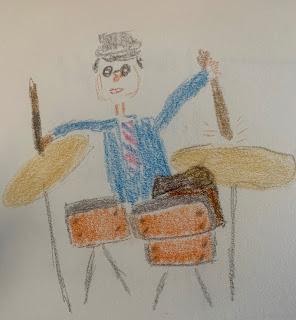Improvisors
Michael is a musical force in his own right, always was. The talent that made Von a sensation at 12 helped Michael stand out at 21.
He’d gone to the South Side one Tuesday, like all the other guys coming up. Von played a set then invited them onstage to jam, that’s how it worked. Michael went to watch, to learn, to play with the best, and that’s exactly what he did. That night and for the next 20 years.
Five minutes after walking in the door, Michael was asked to play. With the Southport Records crew in attendance, he made an impression, and destiny built from there. Within three days, he’d recorded his own tracks with Von. Six weeks later, Von’s drummer died in the bathtub. When he didn’t show for the gig, Michael set up the drums and began to play.
He never stopped.
One thing about Michael, the guy could riff. To play with Von you had to. You had to know music from the inside out. Had to be as spontaneous as he was.
By the time we met, Michael was in his thirties and a seasoned pro. He had a way of biting his lip, closing his eyes and leaning into the drum set. A little closer, a little lower, as if the drums held all the secrets, the fleeting rhythms, of a memorable performance.
We met at Tower Records when Tower Records was a thing. It was a Monday in September when he approached me in the jazz section, I thought he worked there. The day before, I’d read a feature on Louis Armstrong in the Sunday Times. Now I had a hankering for Satchmo.
Fresh off a run through Lincoln Park, beads of sweat glistened on my forehead when I heard a voice. “Nothing against Louis, but Dexter Gordon’s ‘Go’ is on sale if you’d rather have that.”
I observed Michael’s dark brown eyes, his fair skin. The wavy, mocha-colored hair and round, black-rimmed glasses. A charming smile spread across his face, revealing flawless dental hygiene. In the light of his fresh glow, I felt myself shrink like a wilted daisy after a storm. Everything, from the hairline down to the ankle socks, was damp. I allowed myself to go to Tower in this sweaty state because it was on my way home. Had been prepared for a quick encounter with Louis Armstrong, not a meet-and-greet with a handsome record store clerk.
“I don’t know Dexter Gordon,” I said, taking the CD from him. “I’ll give him a try.”
“Why do you have ink on your hands?”
“Huh?”
“The ink. On your hands.”
Michael pointed it out for emphasis. I looked down, noting Kincaid’s weekly bar specials scrawled in black Sharpie all over the back of my hands.
“Oh, that,“ I said with a laugh.
I explained how I wrote for Metromix. How someone had called to update their bar specials. How I couldn’t find a notebook, so I wrote them on my hands.
“Naturally,” Michael said with a smile.
“Yes, naturally.”
I smiled too, but I was mortified.
He walked me over to the register, stood beside me.
“Aren’t you gonna ring me up?”
“Oh, I don’t work here.”
“You don’t?”
“I’m a musician, a drummer.”
That’s how I met Michael. That’s how I learned who Von Freeman was.
_________________________________________
Looking at it now, it’s easy to see I was riffing as much as they were. Maybe that’s what brought us together. Not overtly, but beneath the surface, like some powerful current. Von and Michael were masterful improvisors. So was I.
They riffed onstage, I riffed through life. Dropping 25 milligrams at a time seems the most obvious example, but there were others. Like writing bar specials on my hands, walking to the gym to save on bus fare, or using colored hairspray to hide the grays. At the Swedish bakery a block away, I’d buy a 69-cent doughnut to get a free cup of coffee (value $1.75).
Whether using body wash as shampoo or grocery shopping at Walgreens, I was riffing on an unprecedented scale, and never more so than after the accident. A CT scan here, an MRI there, the medical bills had piled up. Before I knew it, the tally had exceeded ten grand. I paid what little I could then looked the other way.
In the months after my recovery, life was controlling me, not the other way around. My apartment was a mess, payments were late, and all my courage had been spent on tapering. Somehow courage was all around me in the talents of others, and I sought to recapture it through osmosis. The Von Freeman Quintet became one of the few constants I could rely on. Along with Lakeshore Athletic Club and Sunday dinners, it was one of three things in my Chicago life that offered any stability.
Focusing on the band’s improvising meant I didn’t have to question my own. I could watch Von whittle furiously upon the sax, listen to Michael rat-a-tat-tat, and be present for once in my life. Young John Young was on the piano then. His playing made for its own special treat. He and Von had played together for 50 years. Their every chord told the tale of friendship.
Hearing them play made me feel grounded in something familiar. It was an escape from the madness of everyday life, but the music felt like home. Home within me. With the Von Freeman Quintet onstage, I didn’t have to pick apart my life, worry about money or analyze how I was feeling. I could lose myself in the music right along with them. And I did.



